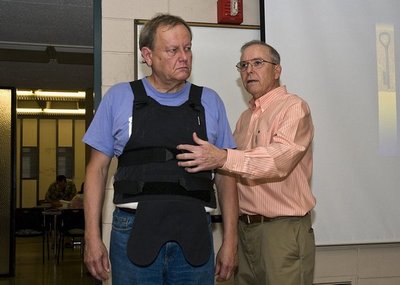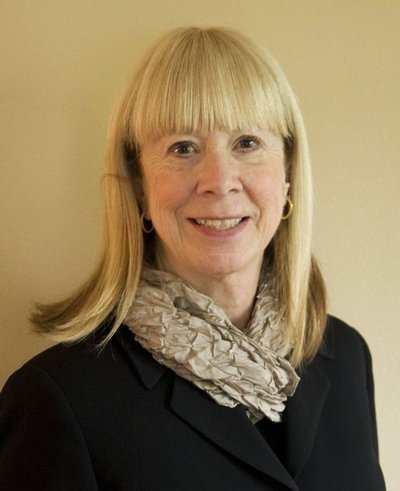August 6, 2009
Chaos theory, ‘Ulysses,’ murder and more — Osher Institute for Lifelong Learning has lively classes for those 50 and up
As new director of the Osher Lifelong Learning Institute at the UW, Lois Lussier did what many new campus leaders do — she visited a few classes to get acquainted. She came away impressed and delighted.
“There is so much magic!” Lussier said. “I’m seeing people from their 50s well into their 80s with their eyes glowing and engaged in conversation with instructors, and instructors excited to find these magic students.”
The Osher Lifelong Learning Institute at the UW — OLLI-UW for short — offers a variety of low-cost classes and special events for those age 50 and up, many taught by current or retired UW faculty. There are no papers to write and no tests to take — participants attend simply because they want to learn something new. An annual fee of $110 buys entry into unlimited courses, though each class also bears a separate $10 fee. Participants also get a year’s access to the UW Libraries system, in person or online.
The class selection is varied, with offerings in the arts, literature, history, local historical topics and even some real science. This summer, for instance, participants can explore theater and literature through such classes as Chekhov and The Cherry Orchard, All the World’s a Stage, The Play’s the Thing — Adventures in the Human Spirit and Demystifying Ulysses. There’s even a class called Opera Appreciation Roundtable.
Matters of law, governance and world views will be examined in classes such as Rise of American Democracy, American Laws: Procedures and Guantanamo; Understanding Islam, and a lively class called Introduction to Murder: The Reality of Investigation and Prosecution.
Sharing Lussier’s enthusiasm is Bill Reinhardt, UW professor of chemistry with an adjunct appointment in physics, who teaches one of the institute’s most popular classes, From Chaos Theory To Quantum Mechanics: What’s New in Science and What Scientists Can and Can’t (!) Predict.
“Osher students are really fun to teach, because they’re interested,” Reinhardt said. “They’re bright people who read the paper and know what’s going on.” Every one of his classes is full, he said, and people rarely skip a session.
Like his fellow instructors, Reinhardt strives to keep the classes as entertaining as they are informative. “I play the cello, I wave Slinkies, I show fractal patterns in many colors. These patterns are really breathtaking and people are stunned, both by their existence and their beauty. I like people to go ‘ooh’ and ‘aah,'” he said.
“I have a good time with these people. I have hedge fund managers (in classes) … I say, ‘You have an audience. Make a financial prediction that will be useful to these people 12 to 24 months from now, and they say they can’t. I say, ‘That’s chaos theory!'”
“It’s just a lot of fun to do it,” said Gary Admire, a former prosecutor and state and federal judge who teaches Introduction to Murder. He also offers another well-received course called Famous Murders in History. Admire, who has prosecuted “50 homicides, at one stage or another,” said he has had mystery writers come to his classes to learn information that helps make their writing more realistic.
Overseen by Educational Outreach, the institute has been operating at the UW since 2006. Classes are offered at three locations so far: the UW’s Seattle campus, at Trilogy at Redmond Ridge (a community for those 55 and up), and at 3025 Lombard Ave. in Everett — the institute’s newest location.
Funding for the UW institute comes from the national Osher Foundation, which was founded in 1977 by businessman and philanthropist Bernard Osher “to improve quality of life through support for higher education and the arts,” according to the foundation’s Web site.
The foundation turned its attention to mature students in higher education back in 2001. Its first endowment grant was to the Senior College at the University of Southern Maine, which then changed its name to the first Osher Lifelong Learning Institute. The program expanded to the University of California system in 2002. Nationwide, there are 122 institute sites, with one or more in every state.
Susan Turner, OLLI-UW’s senior director of academic programs, said David Szatmary, vice provost for UW Educational Outreach, was instrumental in forging the UW’s connection with the Osher Foundation. The foundation offers up to three grants of $100,000 “toward a program that is leading to a status of being self-sustaining.” The UW program is now in its second one-year grant and preparing to apply for the third.
“After that we apply for a million-dollar endowment from the foundation, and by that time we hope to have 800 to 900 members actively involved,” Turner said, adding that there are 550 now, with more expected in the fall.
Turner said the institute also is looking to expand to new locations in the Seattle area — perhaps the next being south of the city. They need a minimum of 150 participants to start classes in a new location, she said.
Given the enthusiasm of participants and teachers, that doesn’t seem a daunting goal.
As Lussier said after her class visits, “I keep hearing over and over again that this is the best-kept secret in Seattle.”
For more information on the Osher Lifelong Learning Institute at the UW and its classes, click here.


